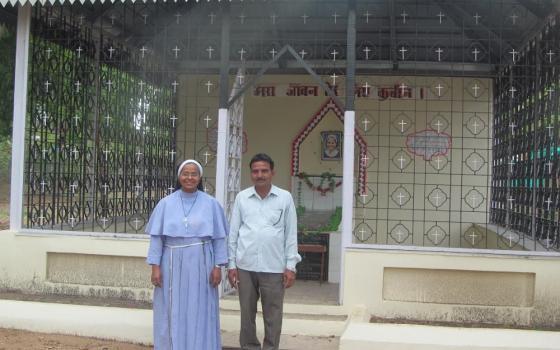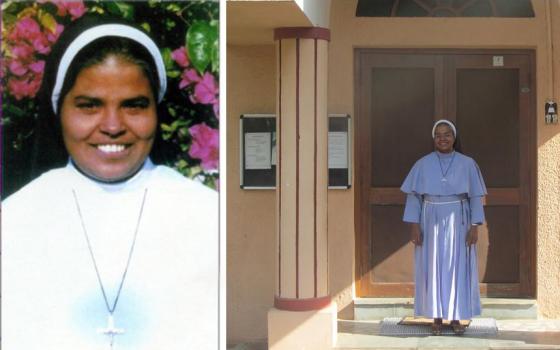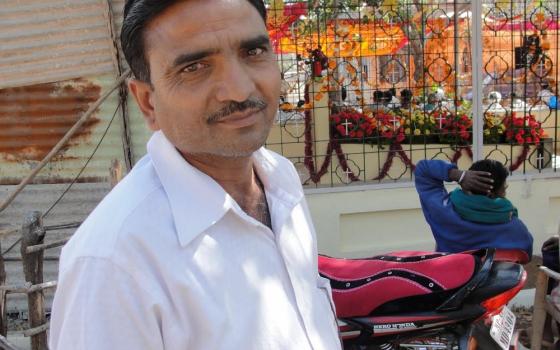Sr. Selmy Paul was bedridden with intestinal cancer when her elder sister, Rani Maria, also a nun, was attacked by a hit man inside a bus in central India 20 years ago. The attacker, Samandar Singh, then dragged Rani Maria out of the bus and kept stabbing her until she bled to death on a roadside with scores of passengers looking on. The autopsy revealed that her body bore 54 stab wounds.
Some landlords had hired Singh to kill Rani Maria because her attempts to empower poor landless laborers had upset them.
Selmy Paul and Rani Maria belonged to the Franciscan Clarist Congregation in India and were working as missionaries in Indore, one of the Catholic dioceses in Madhya Pradesh state.
Singh was arrested immediately after the crime and was jailed. After years of trial, he was convicted and sentenced to 20 years of hard labor. However, his jail term was reduced after Paul and her family sought his early release. Paul forgave Singh and encouraged her family to accept him as a member. In 2002, she visited Singh in the jail and tied a sacred thread called “rakhi” on his wrist on the Hindu festival of siblings, Rakshabandhan (bond of protection).
Rakshabandhan takes place either in August or September, and to mark it, Hindu women tie the colored threads on their brothers’ wrists to profess their relationship. Sometimes they also tie the thread on men who are not their biological brothers. Once a woman ties the rakhi, the man is obliged to protect her as his sister throughout his life.
Paul is now the superior of the Franciscan Clarist convent at Udainagar in Dewas district, which is 20 km, or about 12 miles, south of Nachanbore Hill in Indore district where Rani Maria was killed. Paul also teaches mathematics in a school managed by Indore diocese.
In an interview with Global Sisters Report, Paul, now 50, explains what prompted her not only to forgive her sister’s murderer but to accept him as her brother.
What was your feeling when you heard about your sister’s killing?
Initially, I was not told that she was brutally stabbed to death. My superiors told me she was attacked. My first question to the Lord was why he chose to call her back instead of me. It should have been me because I was then almost on my deathbed as a cancer patient. I was also struck with malaria and jaundice and had become very critical.
What did you do when you finally came to know the real story of her death?
You see, I was not able to move on my own at that time. A day after the incident, the sisters took me in an ambulance to Indore where her body was kept. During the journey, they slowly explained to me the details about the tragedy. When I entered the room where her body was kept, I felt a sort of calmness, which I cannot explain even now. I wanted to touch her wounds, but I was not allowed. The sisters who were with me immediately took me out. But one touch on her body gave me a different feeling.
Did you know then that she was stabbed 54 times?
Yes. I felt so bad that she had to die such a horrible death with no one around to help her. I asked Jesus why it happened to her. She was someone who was living for the poor and their cause. Then I heard a quiet voice telling me, ‘She was not alone; I and Mother [Mary] were with her.’ This brought an unusual calmness in me.
What happened then?
It was then I realized that she got what she wanted.
What she wanted? Do you mean that she was aspiring for such a death?
Not exactly. She used to tell me that she wanted to die for the poor. And now she got a chance to die for the poor. I then realized that those who killed her were instruments in the hands of God to accomplish his mission. This realization helped me forgive her killer and his masters.
How could you forgive the one who killed your sister so brutally? Didn’t you feel any anger against him?
Obviously, I was angry with the killer at first. But the message that Jesus and Mother Mary were with her at the time of her ordeal made me understand that it was all part of God’s plan for her. If it was God’s plan, why should I be angry or harbor hatred toward him [Samandar Singh]?
If this was the case, why did it take seven years for you to publically express your forgiving love toward Singh?
You see, I had pardoned him already in my heart. I also shared it with my sisters. They not only rejected it with contempt but said Singh should be paid in the same coin. I pleaded with them not to think in that way since whatever happened was according to God’s will. Gradually they stopped making such statements before me.
Who gave you the idea of tying ‘rakhi’ on Singh’s wrist?
When I shared the idea with my superiors and the then bishop of Indore [the late George Anathil, SVD] they all disagreed with me. They insisted that I should do it after the case came to its logical conclusion. Because of my health, I was also not in a position to go on my own to jail and meet him. But I kept praying to God for giving me an opportunity to meet him.
One day I shared the idea with a Carmelite of Mary Immaculate priest, Fr. Andrews Athapilly. He said it was the real missionary spirit and suggested to me to meet Singh. The priest said the ideal time would be Rakshabandhan. But the question remained as to who would take me to Singh in jail. When I requested the priest, he asked me to get the bishop’s permission. The bishop turned down the idea.
Then, how did you manage to meet Singh?
I was happy that I pardoned Singh. But I felt the need to pray more before meeting him. I started perpetual adoration for that intension. On July 15, 2002, another CMI priest, Swami Sadanand, called me and asked whether I was willing to meet Singh in jail. I immediately asked him who will take me to him. He subsequently made all the arrangements for my meeting with Singh. On August 21, 2002, the Rakshabandhan day, I tied rakhi on Singh’s wrist inside the jail in Indore.
What was going on in your heart then?
That was our first meeting. Obviously, I was anxious, but I kept praying for him.
Did your eyes meet?
No. I was looking at him but he kept his eyes down. When he came from the cell to the visitors’ gallery, he looked frightened and was shivering. As soon he came close to me, he folded his hands and said, ‘Forgive me, it was a grievous fault from me and I will do penance for it.’ I consoled him saying, ‘We have forgiven you and God too has forgiven you.’ Since we had only five minutes for the meeting, I immediately tied rakhi on him and gave him a pack of laddoos [an Indian sweet given on joyous occasions.] He distributed the sweets among us with a taut face.
What was your feeling when you left the jail?
I felt relieved. I had completed my mission that I was waiting to accomplish for seven years.
Your family too has accepted him as a member. How did that happen? Did you encourage them?
My family consists of two brothers and five sisters, besides the parents. I had already discussed with them my plan to meet Singh and they supported it. They also expressed their desire to meet him in jail. My mother [Elishwa Vattalil, now 88] met him in jail in 2003. She also kissed his hands that had stabbed Rani Maria.
Did you try to get Singh’s jail term reduced? Shouldn’t you have allowed him to compete the full term?
After we accepted him as our family member, we all wanted him to come out of the jail as early as possible. He was sentenced for 20 years in jail. When we consulted legal experts about his early release, they advised us to appeal to the authorities in Madhya Pradesh state, such as the governor and chief minister. We did so, but it took four more years to see the results. He came out of the jail in August 2006, after spending 11and a half years there. Even his family members did not support us initially. But we kept pressing them and their hard stand thawed finally. His younger brother gave the commitment for his release.
What have you learned from this episode?
Rani Maria’s death was God’s plan to spread His message in a region where Christians and Christianity are not well known and where Christians are accused of illegal conversion of the poor. Now those living in the area where Rani Maria died have begun to realize that Christians are not for conversion, but for serving the poor. One day a student asked me how I could forgive Singh. I replied, ‘God permitted me to do so.’ I am convinced that God works through such incidents, which according to our eyes are only cruel acts done against an individual or humanity.
How can you be so sure that it is God’s plan?
Everyone in my family being able to forgive Singh is a sign that even such cruel acts happen only because God allows them. Otherwise it is not humanly possible to forgive others, especially in our society where taking revenge is considered normal and just. So much violence takes place in our society just because people want to take revenge. It is in this milieu that Christians have to forgive those who do them harm as is shown by Lord Jesus through His crucifixion. The central message of Christian life is forgiving love. To forgive is our duty as Christians.
Who were the people Rani Maria was associated with? What did she do for them?
They were Dalit [former low caste] and tribal people who were landless laborers. They worked for rich landlords who neither paid them even minimum wages nor followed any labor laws. They treated the workers almost like their slaves. After Rani Maria started educating the laborers about their rights, they started asking for just wages. Under her inspiration, they began sending their children to school and formed self-help groups and credit unions. All this helped improve their socioeconomic conditions drastically. Exploitation stopped gradually. The landlords cannot exploit them now as they used to do earlier.
Several attacks on Christians and their institutions take place these days. How do you view them?
It is nothing unusual. Christianity always grew amid bloodshed and attack. Christ himself had to shed his blood. However, such attacks will never defeat God’s mission. Christianity will flourish as long as Christians practice forgiving love. We have to pray for everyone who attacks us and kills our people. Our attackers do not know God and his love.
You said earlier that you were suffering from cancer when Rani Maria was killed. How is your health now?
The cancer was first detected on September 20, 1991, when I had a surgery for suspected appendicitis in a hospital in Singrauli district of Madhya Pradesh. I was then shifted to Regional Cancer Center in Kerala [southern India] where I underwent treatment for seven months. Tests after seven months showed that cancer had spread to my liver, too. I then got discharged from the hospital and returned to Bhopal so that I could die in my mission. I also started taking homeopathic medicine from a doctor in Kerala.
During those days Rani Maria used to care for me. She consoled me saying that I would recover. But I laughed at her saying how could cancer be cured. But she continued to insist that I would be cured.
A lump of 3-4 centimeters is still there, but there is no pain or other problem. One day I saw Rani Maria in my dream, caring for me while other relatives were standing around. Then one of the relatives asked her, ‘You had several wounds on your body, are they all cured?’ Rani Maria replied: ‘Only one was left and that too cured.’ I woke up suddenly and believed she was referring to my disease. The cancer has not troubled me since then.
There is a move to canonize Rani Maria. How do you look at it?
The process is on. I personally have no take on it. I believe Rani Maria had done her part and left the world. What she had done is known to everyone in the area and even the world outside. Canonization is a process in the church, and I have nothing to say about it.
Do you have a message for Christians and religious persons?
The world should be filled with the Christ’s forgiving love. If every Christian starts forgiving those who harm them, the negativity will disappear from life and the world will become peaceful and meaningful.
[Saji Thomas is a freelance journalist based in Bhopal, a central Indian city. He has worked for several mainstream newspapers such as The Times of India. This article is part of a collaboration between GSR and Matters India, a news portal started in March 2013 to focus on religious and social issues in India.]



